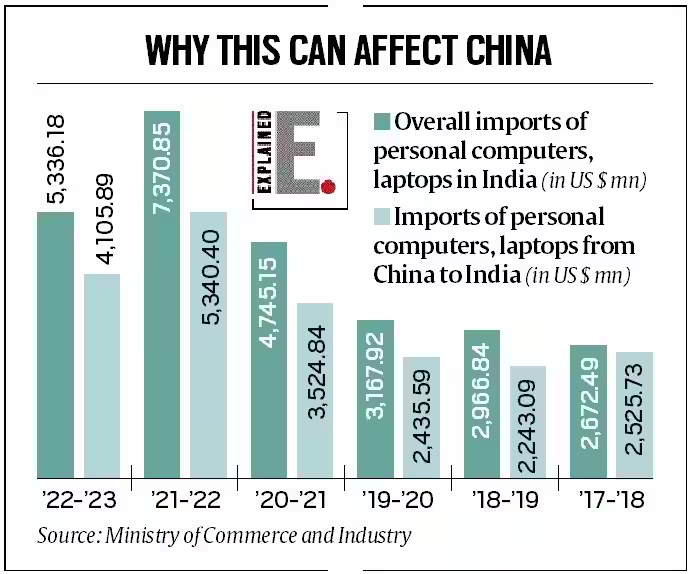Ahmedabad
(Head Office)Address : 506, 3rd EYE THREE (III), Opp. Induben Khakhrawala, Girish Cold Drink Cross Road, CG Road, Navrangpura, Ahmedabad, 380009.
Mobile : 8469231587 / 9586028957
Telephone : 079-40098991
E-mail: dics.upsc@gmail.com

Import Restriction
News: Recently, the GOI has imposed import restrictions on laptops, tablets and personal computers.
Background:
• The Indian government has recently imposed import restrictions on laptops, tablets, and personal computers with immediate effect, with the primary objective of promoting local manufacturing.
• According to the notice shared by the government, these products can now only be imported if a valid license for restricted imports is obtained. This move aligns with India’s ambitious vision to establish itself as a global manufacturing hub, focusing particularly on the electronics sector.
• In 2022-23, imports of personal computers, laptops, etc. stood at $5.3 billion, with China accounting for an overwhelming share of these.
• Under Section 3 of the Foreign Trade (Regulation and Development) Act, 1992, the Central Government is empowered to make provisions related to imports and exports.
What are the benefits of import restriction?
• Promote local manufacturing and production by reducing competition from foreign imports.
• Encourage the development of domestic industries and supply chains, which can create jobs and stimulate economic growth.
• Ensure compliance with international trade rules and agreements, such as the World Trade Organization (WTO) rules on trade remedies.
• Generate revenue for the government through tariffs, duties, or other fees imposed on imported goods.
• Import restrictions and substitution is used as a policy tool so that a country is largely self-reliant in order for it to be able to react in a time of war.
What are the disadvantages of import restriction?
• The cost of products that consumer will pay is likely to increase due to limited supply and high demand.
• No incentive for domestic manufactures to invest in innovation, product quality as there is dearth of foreign competitors.
• Import licensing could increase the space for bureaucratic discretion.
• Arbitrary restrictions will undermine the country’s efforts to attract value chains away from China.
• Lower capacity to produce may also negatively impact growth opportunities, harm employment generation and profitability in the long run.
Way Forward
• The government should focus on creating conditions that encourage integration of India with global value supply chains and take advantage of the ‘China plus one’ approach being adopted by many multinationals.
What is China plus 1 strategy?
• The China plus one approach is a business strategy adopted by companies, especially multinational corporations, to diversify their production and supply chain activities by adding an alternative manufacturing or sourcing location to China. This strategy is also known as “Plus One” or “C+1” and was coined in 2013 as a response to the rising labor and production costs, as well as the political and economic risks, of relying too much on China.

Address : 506, 3rd EYE THREE (III), Opp. Induben Khakhrawala, Girish Cold Drink Cross Road, CG Road, Navrangpura, Ahmedabad, 380009.
Mobile : 8469231587 / 9586028957
Telephone : 079-40098991
E-mail: dics.upsc@gmail.com
Address: A-306, The Landmark, Urjanagar-1, Opp. Spicy Street, Kudasan – Por Road, Kudasan, Gandhinagar – 382421
Mobile : 9723832444 / 9723932444
E-mail: dics.gnagar@gmail.com
Address: 2nd Floor, 9 Shivali Society, L&T Circle, opp. Ratri Bazar, Karelibaugh, Vadodara, 390018
Mobile : 9725692037 / 9725692054
E-mail: dics.vadodara@gmail.com
Address: 403, Raj Victoria, Opp. Pal Walkway, Near Galaxy Circle, Pal, Surat-394510
Mobile : 8401031583 / 8401031587
E-mail: dics.surat@gmail.com
Address: 303,305 K 158 Complex Above Magson, Sindhubhavan Road Ahmedabad-380059
Mobile : 9974751177 / 8469231587
E-mail: dicssbr@gmail.com
Address: 57/17, 2nd Floor, Old Rajinder Nagar Market, Bada Bazaar Marg, Delhi-60
Mobile : 9104830862 / 9104830865
E-mail: dics.newdelhi@gmail.com